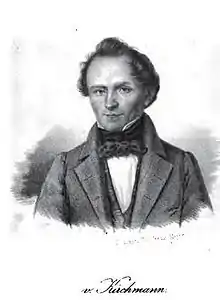Julius von Kirchmann | |
|---|---|
 | |
| Born | 5 November 1802 |
| Died | 20 October 1884 |
| Nationality | German |
Julius Hermann von Kirchmann (5 November 1802 – 20 October 1884) was a German jurist and philosopher.
Biography
Kirchmann was educated at Leipzig and Halle. In 1846 he was made state's attorney in the criminal court of Berlin, and two years afterwards was chosen to the Prussian National Assembly. From 1871 to 1876 he was a member of the German Reichstag. His philosophy was an attempt to mediate between realism and idealism.[1]
Writings
Kirchmann first attracted attention as a philosopher by his brochure Die Wertlosigkeit der Jurisprudenz als Wissenschaft (The worthlessness of jurisprudence as a body of knowledge; 1848). His other philosophical writings include: Ueber Unsterblichkeit (On immortality; 1865), Aesthetik auf realistischer Grundlage (A realistic foundation for aesthetics; 1868); translations of parts of Aristotle, Roger Bacon, Hugo Grotius, David Hume, Gottfried Wilhelm Leibniz, and Baruch Spinoza, and a remarkable edition of Immanuel Kant in the Philosophische Bibliothek, edited by him (1868 et seq.), and of Thomas Hobbes' De Cive (1873).
Notes
- ↑ On fugacity of law he said: "only three words of the legislature can destroy whole libraries": (in Italian) Giampiero Buonomo, Le leggi e gli statuti, in Mondoperaio, n. 1/2016, p. 80-81.
References
- Gilman, D. C.; Peck, H. T.; Colby, F. M., eds. (1905). . New International Encyclopedia (1st ed.). New York: Dodd, Mead. This work in turn cites:
- Lasson and Meineke, Julius von Kirchmann als Philosoph (Halle, 1885)
External links
- . Encyclopedia Americana. 1920.